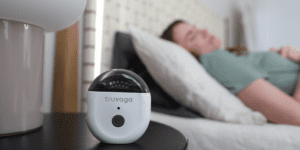It’s not novel: the idea of a toolkit as more than a means of securing literal nuts and bolts, but as a set of resources tailored to troubleshoot, fix or simply provide some measure of relief for very specific problems.
When it comes to problems requiring a set of bespoke tools and curated solutions, stress might as well be a ’73 AMC Gremlin (yes, that’s a real car… that’s really hard to fix).
We like to think of a stress toolkit as your personalized battle plan against stress. Because once you’ve identified any early warning signs of stress negatively impacting your life, you can seek out the strategies and resources uniquely suited for your situation.
With that said, take the following list of ideas as just that — potential additions to your toolkit. And if they don’t quite fit, they may just be a fitting muse to send you down the right path toward landing on the right options.
Think (& Listen) Outside the Box
Sleep On It
It’s a vicious cycle.
Poor sleep, which is defined as less than 7 – 9 hours a night, causes stress. And higher stress can make it more difficult to sleep.[2] Reset and repeat.
So, put a pillow in your stress toolkit. But you’ll need more than your favorite memory foam sleeping aid to get your sleep back on track. Here are a few ideas from the American Psychological Association:
- Read a book, don’t stare at a screen. Phones, tablets and TVs are known suspects for robbing us of sleep.
- Soak in some sun. Even 30 minutes of time outdoors daily can help get our minds and bodies in a better rhythm when the moon comes up.
- Eat, drink (responsibly) and be merry: But not right before bedtime. Alcohol and big meals are proven to make it more difficult to catch your Zzzz’s.
- Set the stage for sleep. In other words, make sure everything from the mattress to the lighting and the noise is just right for you. And when you’re traveling, do your best to replicate the environment you know works best for you.
Just Take the First Step…
This is a pretty meta concept, but hear us out: just the process of making the stress toolkit is a way to manage stress. Get together with co-workers, family, or friends, and take time to sit down and map out toolkits together in a supportive environment. [3]
Not only does it help ensure that you actually complete the homework, but spit-balling ideas together and hearing others’ feedback can help strengthen your own toolkit. You can also create shared accountability about using the selected tools come crunch time. Finally, simply knowing that you have a plan to put in action when stress is elevated can help ease the rising tension.
Tap into Technology for Real-time Relief
Old-school stress management methods, such as a good night’s sleep or a good chat with a friend, can do a lot of work. But they’re not available on demand. A Truvaga hand-held vagus nerve stimulator can gently and quickly activate your vagus nerve in a pinch. Reduce stress, sleep better, feel calmer, and think clearer — with quick and easy 2-minute sessions. The science linking vagus nerve stimulation with stress reduction is clear and convincing.
No single stress toolkit is the same. We all have unique, myriad stressors to address. For more ideas, we encourage you to follow us on Facebook or Instagram, where we’re sharing additional ideas for tools and resources, including:
- Taking time-outs when the stress is dialed up
- Packing healthy treats (e.g., dark chocolate) vs. unwrapping sweet coping mechanisms (convenience store candy bars)
- Practicing self-reflection, including journaling
We hope we’ve helped you jump-start your list of potential stress toolkit contents. All that matters is that it works for you, making stress more manageable and life more enjoyable. Good luck!
Sources:
[1] Dear Stress, I’m over you. Office of the California Surgeon General. https://osg.ca.gov/dearstresstoolkit/
[2] Stress and Sleep. American Psychological Association. https://www.apa.org/news/press/releases/stress/2013/sleep
[3] Elisabeth Nails, MSW. Stress and Anxiety Toolkit, a resource guide for the UCLA community to reduce stress and promote wellbeing. https://healthy.ucla.edu/wp-content/uploads/2020/08/Stress-Anxiety-Toolkit.pdf






